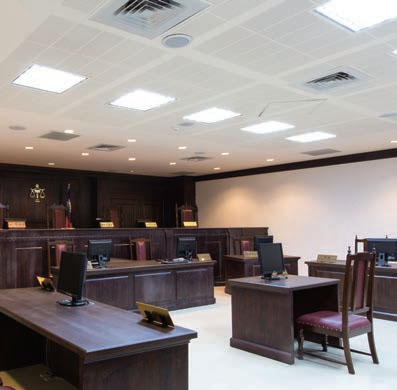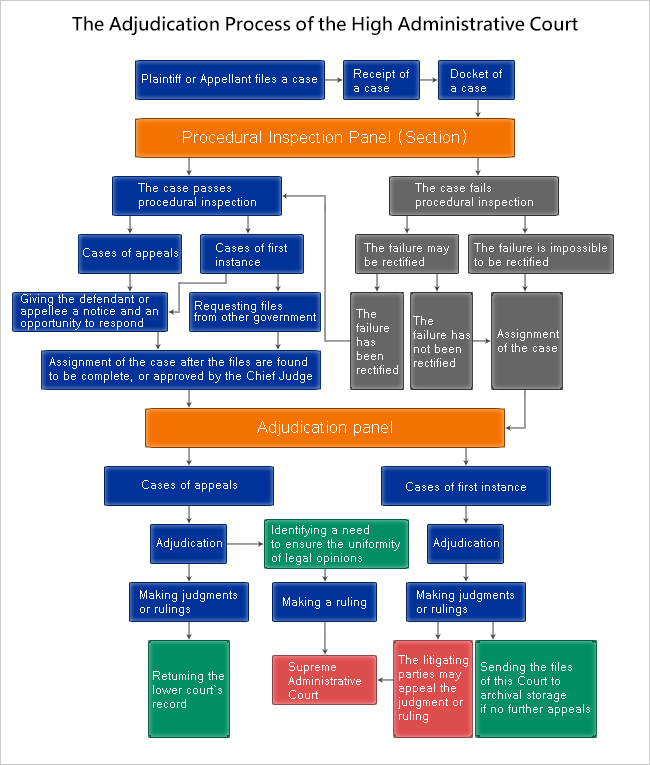
Overview of the Judicial Functions at the Court
This Court has jurisdiction over, in the geographical area covered by this Court, the first instance in ordinary proceedings, and the second instance of the judgments and rulings rendered by the administrative litigation panels of the district courts. Whenever this Court receives a case of the aforementioned types from litigating parties, the clerks of the Procedural Inspection Section of this Court initially check whether the case complies with procedural requirements. If not, the Presiding Judge of the Initial Review Panel orders that the litigating parties satisfy all procedural requirements within a designated period. If the clerks of the Procedural Inspection Section find the case complies with procedural requirements, or if, after being ordered by the Presiding Judge of the Initial Review Panel, the litigating parties satisfy all procedural requirements within the designated period, this Court sends the plaintiff’s complaint to the defendant or sends the appellant’s brief to the appellee. If there is a need to request files from other government offices, such as the files at the stage of administrative acts and the files at the stage of administrative appeals, this Court will make the request at the same time. After the files are found to be complete or, in special circumstances, are approved by the Chief Judge, the case would be randomly assigned as a case of merits matters to adjudication panels by computer. If the litigating parties fail to satisfy all procedural requirements within the designated period, or if the failure to satisfy a procedural requirement is impossible to be rectified, the case would be assigned as a case of procedural matters.

In principle, judgments for administrative litigations can be made only after oral arguments between the litigating parties. In contrast, appeals for summary proceeding cases and for rulings with regard to traffic violations may be made only on the ground that the existing judgment is contrary to laws and ordinances, and such appeals are principally adjudicated on the basis of written submissions to this Court. However, oral arguments may be held when this Court finds either pursuant to its authority or on the litigants’ motion that one of the three circumstances listed in §253 I of the Administration Litigation Act is applicable. The adjudication panel of this Court, consisting of three judges, decides cases through deliberation. In deliberation, the Presiding Judge acts as the chairperson and the panel reaches conclusions by simple majority.
The major types of administrative litigation are actions for revocation, actions to order administrative acts, actions for declaration, and actions to order performance. The issues of law involved in the cases heard by this Court include various issues of taxes, customs, land appropriation, insurance, government personnel, education, fair trade, alleged traffic violations, etc. Of these various issues, cases that concern issues of taxes and customs are the most common, approximately 27% of the total caseload of this Court. Since central government, ministries and the subordinates are located within the territorial jurisdiction of this court, the caseload of this Court, approximately two-thirds of the total caseload of administrative litigation, is the heaviest in Taiwan.
For the purpose of enhancing efficiency and encouraging judges to develop their specialties, this Court allows judges to choose to specialize in and adjudicate only certain kinds of administrative litigations. Judges of this Court may choose to adjudicate only cases that concern particular issues, such as (1) cases about national taxes ( including individual income tax, enterprise income tax, and business tax), (2) general tax cases (including estate tax, gift tax, land tax, house tax, commodity tax, entertainment tax, etc.), (3) fair trade cases and insurance cases, and (4) customs cases. Starting from September 3, 2014, judges of this Court may also choose to adjudicate only cases that concern indigenous peoples, including Land Reserved for Indigenous Peoples, Law Governing the Status as Indigenous Peoples, and the Basic Law for Indigenous People. In so doing, judges may adjudicate cases on the basis of their expertise and experiences, thereby ensuring professional and fair judgments that protect the rights and interests of the litigating parties and deepen the trust the society has in the judiciary. This Court also cooperates with Institutum Iurisprudentiae, Academia Sinica, and other law departments and law colleges in holding academic conferences jointly, offering a channel for the exchanges between judges and the academia and enriching judges’ professional knowledge. In addition, the judges of this Court meet every month in the Conference of Judges to discuss difficult legal issues for the purpose of exchanging trial experiences and thereby enhancing the quality of judgments.

- Release Date:2021-04-27
- Update:2021-06-23
